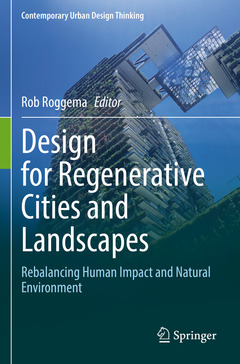Description
Design for Regenerative Cities and Landscapes, 1st ed. 2022
Rebalancing Human Impact and Natural Environment
Contemporary Urban Design Thinking Series
Language: English
Subjects for Design for Regenerative Cities and Landscapes:
Design for Regenerative Cities and Landscapes
Publication date: 05-2023
305 p. · 15.5x23.5 cm · Paperback
Publication date: 05-2023
305 p. · 15.5x23.5 cm · Paperback
Design for Regenerative Cities and Landscapes
Publication date: 05-2022
305 p. · 15.5x23.5 cm · Hardback
Publication date: 05-2022
305 p. · 15.5x23.5 cm · Hardback
Description
/li>Contents
/li>Biography
/li>Comment
/li>
This book discusses the way to design and plan for regenerative cities and landscapes. Where sustainability aims to safeguard the resources for future generations, and the resilience concept focuses on dealing with shocks to keep the system functioning, regeneration aims to give back more than it takes from the system. This principle is often used in analytical and assessment literature, but not yet elaborated in a spatial planning and design context, which this book does. It offers insights from a range of perspectives, spatial scales, such as the country level, neighbourhood public space, streets and the building levels, scientific fields and continents, amongst which Africa, Oceania, and Europe.
1. Design for Regeneration.- 2. The city sustainable, resilient, regenerative – a rose by any other name?.- 3. Using Indigenous knowledge in Climate Resistance strategies for Future Urban Environments.- 4. Mutability and accelerated culture: designing regenerative systems in low-density landscapes.- 5. Regenerating a country by design: Nature-rich Netherlands.- 6. Design for Regeneration -a nature-based perspective on cities.- 7. In-between nature: reconsidering design practices for territories in-between from a social-ecological perspective.- 8. Regeneration of degraded land with nature-based solutions.- 9. The New Local Lens – a framework for local place regeneration and economic diversification.- 10. Brisbane 2032: The promise of the first carbon-positive Olympics for regenerative cities.- 11. The Necessity of Gardening. About Landscape, Strategy and Design in Times of Uncertainty.- 12. Urban green benefits.- 13. Overtaking hindsight.
Prof. dr. ir. Rob Roggema is Landscape Architect, Professor Landscape Driven Design at InHolland University of Applied Sciences, and founder of Cittaideale, office for adaptive design and planning, and visiting professor at Queens University Belfast. He is lead-author of the Architecture, Urban Design and Planning chapter of the third assessment report of the UCCRN. He held several professorship positions at VHL University (Professor of Design for Urban Agriculture 2014-2016), University of Technology Sydney (Professor of Sustainable Urban Environments 2016-2018) and Hanze University Groningen (Professor of Spatial Transformations 2019-2021). Before 2010 he worked for the province of Groningen and municipalities such as Almere, Breda and Rotterdam on the design of ecological and sustainable cities and landscapes. Recently, he led the design of a Nature-Rich Netherlands, the climate adaptive design 2021 for the Groningen region, he initiated the FEW-nexus project ‘the Moveable Nexus’, and he designed the Edible Park in Ede, the Netherlands. Rob has facilitated over 40 design charrettes worldwide and has presented his work at conferences and symposia all around the world.
Socio-ecological systems thinking applied in urban design Design approaches for human-ecology interaction, where mankind is seen as a part of nature Regional and national landscape architecture for regenerative areas
© 2024 LAVOISIER S.A.S.




